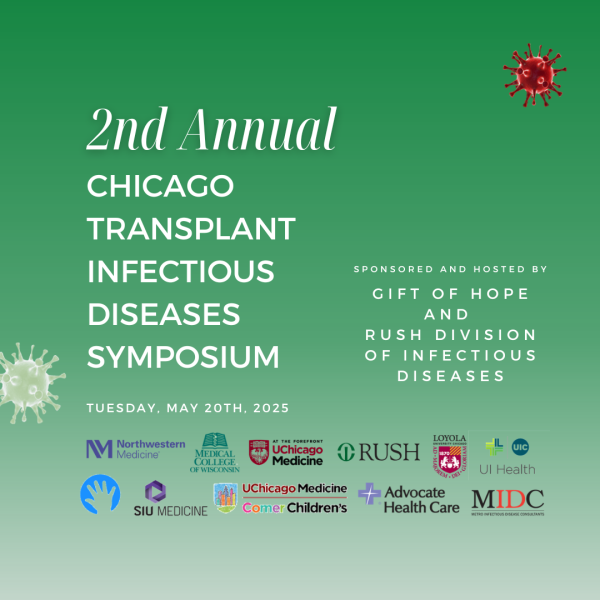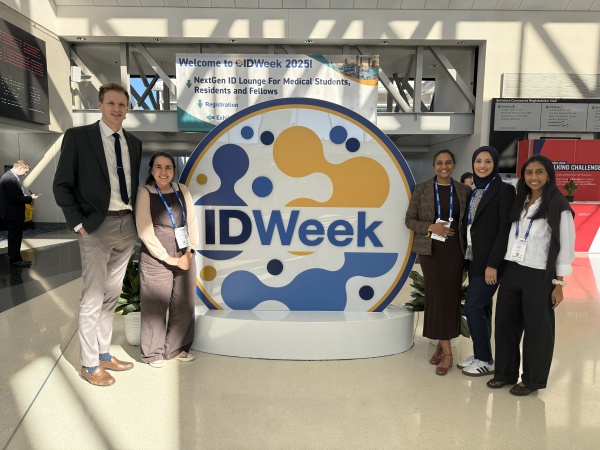Welcome to our Infectious Diseases Fellowship Website
The combined RUSH University Medical Center (RUMC) and Cook County Health (CCH) Infectious Diseases Fellowship Program provides a two-year curriculum with an optional third year of training that is dedicated to training successful Infectious Diseases physicians with the essential building blocks for any desired career path in the field.
We have more than 40 faculty who specialize in 12 areas of divisional expertise and are world leaders in HIV, Transplant ID and healthcare epidemiology research. We're also excited to be 1 of 4 programs in the country to offer a new joint ID/EIS fellowship opportunity, for fellows to train on ID for 2 years, followed by 2 years of EIS (Epidemiology Intelligence Service) training.
Situated in the amazing city of Chicago, fellows can enjoy all of our program advantages and explore all that the city has to offer.
Thank you for your interest in our program! Don't forget to follow us on Instagram (@rushcchid)!

Thanks to our sponsors from Gift of Hope, Rush and UChicago hosted the Chicago TID Case Conference for the second year! The Symposium gives fellows the opportunity to highlight interesting cases, research, and to network with experts in Transplant Infectious Diseases. This year we were joined by fellows and faculty representing 8 transplant centers across the greater Chicagoland area including UChicago, Comer Children’s, Northwestern, Lurie Children's, UIC, Loyola, Medical College of Wisconsin, and Advocate Christ.

During an episode of IDSA’s Let’s Talk ID Podcast, former fellow Dr. Alice Han shares her remarkable journey in the field of Infectious Diseases. In this interview with Dr. Paul Sax, Dr. Han mentions the influence of her fellowship experience at RUSH and it’s impact on her career development.
“And the thing that I appreciated so much about them [RUSH ID faculty members] as individuals is they really cared about us as people, and they really cared about us being happy in our careers”
-Alice Han, MD

We are proud of our hard working faculty members who have been recognized for their excellence in education, service and research! Recently, Dr Sarah Sansom was recognized for her research on antimicrobial resistance presented at the Institute for Translational Medicine's Annual Special Eureka Talks event. Chicagoland researchers came together and presented their ongoing projects. Dr Sansom was chosen for best talk! Over the years, many other faculty members have been honored with university and departmental teaching awards. Recent awardees include Dr Andrew Simms, Dr Shivanjali Shankaran, Dr Sarah Won, Dr Brett Williams, Dr Harris and Dr Beverly Sha.
A brief message from the Infectious Disease Chief Fellows for the year 2025-2026, Dr. Sagel Dubey and Dr. Samuel Starke!
ID Fellows!


We are thrilled and excited to welcome the new fellows this July. As a welcome to the 2027 class, we planned to have a welcome lunch for our division and incoming fellows to enjoy. We also anticipate further activities as a way to get to know each other better!

Our internationally recognized faculty and fellows had the opportunity to participate in the 2025 annual conference, both as presenters and learners. Second year fellows were able to attend in person, where they learned from experts in the field of infectious diseases and interacted with other aspiring infectious diseases professionals. After working hard, they also enjoyed a night out!

